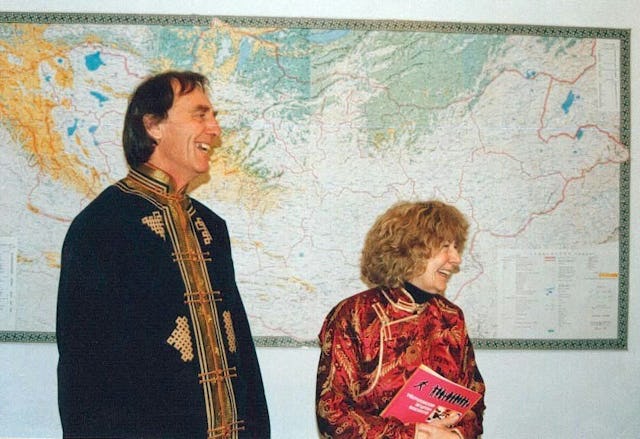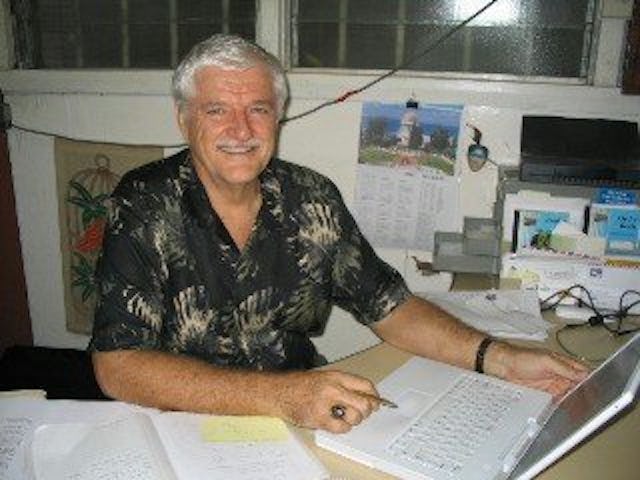Royalty to bestow awards
LONDON — Two members of the Baha'i Faith who left their home countries to contribute to the development of other societies will receive awards from Queen Elizabeth II at Buckingham Palace in July 2003.
Bruce Saunders, an Australian living in the Solomon Islands, and David Lambert, an Englishman now living in Mongolia, will receive an OBE and MBE respectively.
An OBE is an Officer of the Order of the British Empire, and an MBE is a Member of the Order of the British Empire. These awards are made in some countries of the Commonwealth of Nations for valuable service to the nation. They rank below a knighthood. The OBE is the higher award.
Such distinguished awards follow recommendations to the Queen by the governments of the proposed recipients.
Bruce Saunders, 61, is receiving his award for service to the community and business in the Solomons.
Mr. Saunders is currently chairman of the National Spiritual Assembly of the Baha'is of the Solomon Islands.
For 10 years, he served as a member of the Continental Board of Counsellors in Australasia, a senior Baha'i advisory body that assists 17 Baha'i national governing councils (National Spiritual Assemblies).
Mr. Saunders is from Australia where he studied the catering industry. He and his wife, Keithie, moved to the Cook Islands to assist the Baha'i community there.
Two and a half years later, in 1968, they went to the Solomon Islands to help with the family business after the death of Mrs. Saunders' father. They have lived there ever since. (As a child aged seven, Mrs. Saunders accompanied her parents Alvin and Gertrude Blum to become the first Baha'is to settle in the Solomons).
One of the most prominent businessmen in the country, Mr. Saunders has interests, often with his wife, in a range of commercial areas, for example in food, insurance, real estate, tourism, exports and handicrafts.
Mr. Saunders is the only expatriate member of the city council of Honiara, the country's capital. He has been appointed to the position for the past six years by the Minister of Home Affairs. Mr. Saunders also assists in the attempts to preserve the forests of the country and in the promotion of solar energy.
He has been vice-chairman of the Chamber of Commerce and a member of a Government consultative body which interacted between the people and the Government. He has also been on the board of Rotary International, a foundation member of the Lions club, and a member of other organizations.
Mr. Saunders has been closely involved in the development of a civil society network.
Mr. Lambert, 62, is being honored for his services to the development of English language studies in Mongolia. He is chairman of the National Spiritual Assembly of the Baha'is of Mongolia.
He and his wife, Lois, are the longest serving volunteers in the British Volunteer Service Overseas organization.
Mr. Lambert went with Lois in 1992 to Mongolia where he devised a course to train teachers of English how to use modern participatory methods in their work. The Mongolian government has since adopted the course for use nationwide.
Mr. Lambert has also personally taught English to many prominent Mongolians. He is currently Director of Studies at the English for Special Purposes Foundation, which was set up by the United Nations Development Program and now run as a Mongolian non-governmental organization.
He is a member of the first Arts Council of Mongolia, which supports, funds and promotes the arts and culture of Mongolia.
Mr. Lambert developed at Ulaanbaatar's University of Humanities an English language library that is the most extensive in the country. He arranged for British publishers to donate many books and for the United Kingdom government to transport them to Mongolia.
Mr. Lambert, originally from Kent in England, had trained English and drama teachers at the University of Leeds. Before that he headed the English department in a secondary school in England.
It was after teaching English at the University of Nankai in Tianjin in China that Mr. and Mrs. Lambert went to Mongolia.
"We volunteered because we wanted to be of service to humanity, to work for the development of the less advantaged countries and to apply Baha'i principles more fully in our lives and work," said Mr. Lambert.

